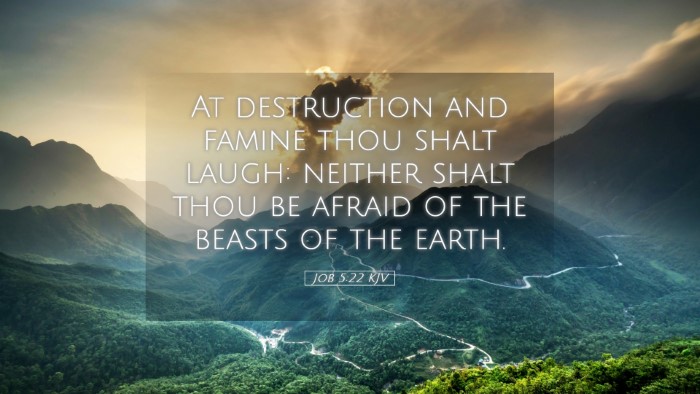Old Testament
Genesis Exodus Leviticus Numbers Deuteronomy Joshua Judges Ruth 1 Samuel 2 Samuel 1 Kings 2 Kings 1 Chronicles 2 Chronicles Ezra Nehemiah Esther Job Psalms Proverbs Ecclesiastes Song of Solomon Isaiah Jeremiah Lamentations Ezekiel Daniel Hosea Joel Amos Obadiah Jonah Micah Nahum Habakkuk Zephaniah Haggai Zechariah MalachiJob 5:22
Job 5:22 KJV
At destruction and famine thou shalt laugh: neither shalt thou be afraid of the beasts of the earth.
Job 5:22 Bible Commentary
Commentary on Job 5:22
Verse: "At destruction and famine thou shalt laugh: neither shalt thou be afraid of the beasts of the earth."
Introduction
This verse from Job speaking through Eliphaz reminds us of the peace and security that comes from a life aligned with God's will. Job 5:22 encapsulates the prospect of divine protection and confidence amid chaos and fear. In offering insights into this passage, we draw upon the esteemed works of Matthew Henry, Adam Clarke, and Albert Barnes to provide a comprehensive understanding suitable for pastors, students, theologians, and Bible scholars.
Contextual Background
The Book of Job explores profound themes of suffering, divine justice, and human integrity. Job, a man described as blameless and upright, faces inexplicable calamities. His dialogue with his friends reveals varying perspectives on suffering and piety. Eliphaz, one of Job's friends, speaks in this verse, drawing on his experiences and theological understanding to offer counsel to Job. His assertions reflect common beliefs about divine retribution and protection.
Interpretation of Key Phrases
- Destruction and Famine: The mention of destruction (often interpreted as calamity or disaster) and famine speaks to severe trials that can befall humanity. Eliphaz suggests that when these occur, the righteous can face them with confidence, anticipating God's protection.
- Thou Shalt Laugh: This phrase indicates an emotional response grounded in faith. The laughter here is not mockery but a deep-seated assurance that arises from knowing God is sovereign over all circumstances.
- Neither Shalt Thou Be Afraid: Fear often accompanies disaster; however, this assurance reflects a trust in God that transcends earthly troubles. Eliphaz implies that a life devoted to God will yield peace during turbulent times, emphasizing the relationship between faith and fearlessness.
- Beasts of the Earth: This imagery symbolizes threats that are often seen as uncontrollable or wild. The mention of beasts aligns with the broader theme of God's dominion over creation, extending protection even in the face of fearsome forces.
Theological Insights
The theological implications of Job 5:22 are profound, encompassing notions of divine sovereignty, human faith, and the nature of suffering.
- Divine Sovereignty: Throughout the Book of Job, we see a clear portrayal of God's sovereignty over creation and life's circumstances. Eliphaz articulates a perspective that God's people can experience divine laughter amid chaos, reinforcing a profound trust in God's overarching plan.
- Human Faith and Assurance: The ability to laugh in the face of adversity is a testament to a robust faith. Matthew Henry reflects that such a response stems from a heart that understands God's providence and care. This laughter serves as a counter to fear, emboldening a posture of resilience.
- The Nature of Suffering: The suffering depicted in Job's narrative raises difficult questions about justice and divine purpose. Eliphaz’s assertion may highlight a covenantal perspective suggesting that righteous living results in divine favor, though it is essential to remember the complexity of Job’s own situation, which challenges simplistic theological formulas.
Practical Applications
For pastors, students, theologians, and Bible scholars, Job 5:22 and its commentary can serve as elucidative tools for understanding how faith interacts with trials. Consider the following applications:
- Encouragement in Trials: This verse offers comfort to those facing dire circumstances. Believers are reminded that God’s presence can transform experiences of destruction and famine into occasions for peace and laughter.
- Building Resilient Faith: Emphasizing the development of faith that can withstand adversities is crucial. Pastoral teachings may encourage congregants to deepen their reliance on God while acknowledging their emotional responses to suffering.
- Creating a Culture of Trust: Communities of faith should foster environments where individuals can support one another in difficult times, ministering to those whose fears may overshadow their faith.
Conclusion
Job 5:22 encapsulates the essence of living in faith amidst life's inevitable storms. By examining this verse through the lens of respected biblical commentators, we cultivate a richer understanding of the interplay between divine sovereignty, human experience, and faith—a necessary endeavor for anyone engaging deeply with scripture.


